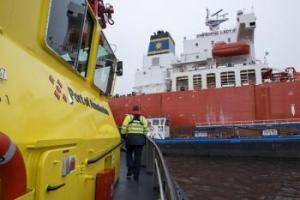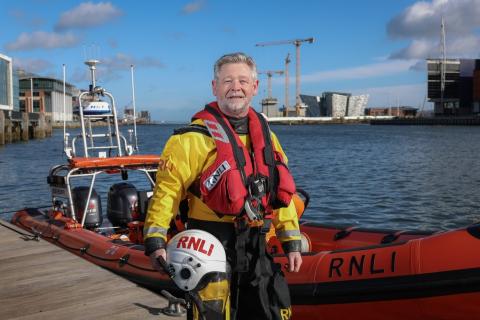Harbour Master
Harbour Masters
Worldwide there are approximately 3,000 merchant ports and the work of the Harbour Master can vary widely from country to country and from port to port even within the same country.


Belfast Harbour Master Kevin Allen discusses the changing face of the maritime industry and developing the skills necessary for the port of the future.
When Belfast Harbour Master Kevin Allen first went onboard a ship at the age of sixteen his goal was less about going to sea, than getting away from land.
Running away from school
“I was basically running away,” he says. ”Given the political situation of this place in the early 1980s and the fact I didn’t like being at school. I saw going to sea as a mechanism to get me away from that. Besides, I grew up in the Port of Larne, and my father spent his whole life at sea. It was a world I knew.”
So, he undertook a cadetship aboard a tanker with BP. It was, he admits, ‘a tough gig’.
“It was like being back with some of things I was trying to get away from!” he states.
He did, however, decide to stick with it, deciding early on in his career that he would like to become a Master Mariner. Before the opportunity arose for that, however, Kevin worked for ten years onboard in the oil and gas sector, sailing mainly with BP and Shell. But throughout this time things were changing in the industry.
“There were some substantial changes taking place. A whole new culture was emerging. There were a lot of redundancies, with the oil and gas companies deciding to move to offshore arrangements and downsizing their fleets considerably.”
Golden ticket
Kevin found himself working a twelve-month contract in the North Sea. From here, he managed to get a three month concession – the time he needed to undertake his Master Mariner’s qualification.
This, which he refers to as his ‘golden ticket’, enabled him to go to work on the ferries – a familiar sector to someone raised in the Port of Larne. He spent the next 14 years sailing with P&O and Stena Line, mainly on services around the UK. It was, however, in Bergen, Norway, in 1996 where he took his first command, aboard P&O’s Jetliner.

Into the harbour
“In November 2005, I delivered the vessel P&O Express to Belfast Harbour for layby. In December that year I was interviewed for the role of Deputy Harbour Master and I started the role shortly after in March 2006.”
After just two years as Deputy, Kevin was asked to take on the role of Harbour Master. This was one of the high points of his long career. There have, he says, also been some low points.
Specifically he recalls the tragic death of his long-time colleague and friend, Deputy Harbour Master, Captain Michael Evans. Michael was killed when travelling for business on his way to a nautical training college in Cork.
Kevin places a lot of value on the support he has received from his family, which has helped him to get through this, and other challenging times.
“I’m happily married to Una and we have three children, all working in various parts of the world. I’ve been well supported. You need that in an operational job like this, whether it’s on land or at sea.”
Out on the water
Despite coming ashore, Kevin still spends a lot of time on the water. Notably in his role in the RNLI in Red Bay, where he serves as Helm, a duty he has performed for the past 22 years. In the last year, he has taken on the additional function of Lifeboat Operations Manager for the station, with the responsibility for coordinating personnel and resources and basically making sure the two lifeboats are ready and available when needed.
Rise of a new generation
Kevin’s arrival in the harbour coincided with a period of major change. A new generation was coming, which required a different style of management, a whole new way of thinking.
“The changes we’ve seen in the Harbour in the last few years have been borne out of operational necessity,” he says. “When I started here, we handled around 16.5 million tons a year. Today’s that’s around 25 million tons. It was a very challenging transition. Back then, the department was very lean. At times there was only myself and a Deputy Harbour Master, Paul Hayes, a suburb steward for the Port and now deservedly retired. That had to change.”
Getting the best out of people
And to effect that transition, Kevin says, you need to be able to find the right people and get the best out of them.
So today, In addition to the Harbour Master and two deputies, the team includes two assistants and three Port Operational Superintendents. This expansion has provided the means to support the harbour with the skills it needed to facilitate growth.
“With more people in the team we are able to offer employees a more sympathetic work pattern. A better work-life balance. Plus, because there are more of them, you have the space to give people chances to take part in training and other development opportunities.
Today’s team, Kevin says, is also more involved in the day-to-day operations than previously. They are, for example, proactively managing changes, having an impact on what their department will look like over the coming years. This serves as a motivating factor to keep employees engaged and meets one of the most important objectives of any marine department – continuous improvement.
Sustainable development
So too, does the increasing diversity of their work. Kevin offers the example of his Assistant Harbour Master Duncan Paterson, a former Tug Master who has worked on a review of the harbour’s towage guidelines; a task which utilised his skill set to best advantage. A further example is Jamie Faulkner, Deputy Harbour Master who completed the procurement of a new Pilot Boat, named Hibernia, from HolyHead Marine and who is supporting operationally the development of new pilot boat technology.
The boat, developed by local company Artemis Technologies, represents a step forward for safety and sustainability in the port, combining advanced electric propulsion with cutting-edge hydrofoil technology.
Kevin declares, “It would also be remiss of me not to mention Arran and Rob, the remainder of the Harbour Master team. They too are engaged in projects, with other world-leading companies, such as TIDALIS, OMC and Royal Haskoning. All of whom are commercial members of IHMA and have presented many times at Congress on innovative solutions to port problems, some of which we are applying here in Belfast.”
The best team
“It’s been hard work but also a privilege to be part of this transition and the growth at the harbour. Where I am now, I have the best possible team in place. But I’ve been here for 18 years now and I won’t be here forever. From a succession point of view, the port is very lucky to have attracted these individuals and to be in the position where we changed the business practice to allow us to get the best out of people.”
The Coronavirus pandemic, Kevin explains, served as a stimulus to some of the changes that have taken place in the harbour.
“The base structure was in place before, but the pandemic had a major impact on the operational environment. I’ve a lot of respect for the way all our teams behaved during covid. To maintain 24/7, 365 days a year, an operation of national strategic significance requires a lot of discipline. There were a lot of people working in this port who made personal decisions on how to stay safe outside of work that would ensure the continuity of their professional service. We didn’t have a single case of covid until the very end of the pandemic.”
Active in the IHMA
Since he took up the work of a Harbour Master, Kevin has been an active member of the IHMA, a member of the Executive Committee, and Treasurer since 2016.
“The knowledge and friendship of fellow professionals is outstanding. I’ve met some of the best people, at the top of their game, through the IHMA.
“Sharing experience with these experts in an informal, social context – you can’t buy it. Take the Congress, for example. As can be seen from the projects we’re working on, every time you come back, having learned something you know you will put to use at some point.”

IHMA European Congress May 2025
A challenge for the future, as for any internationally focused organisation, he says, is to continue to break down cultural and linguistic barriers, and provide a platform for people to meet face to face.
A part of this is the revamping of the European Harbour Masters Congress, which takes place bi-annually in between IHMA Congresses.
Next year, the IHMA European Congress will take place, between 21 and 23 May, in the historic Belfast Harbour Offices. Although not finalised the event is likely to focus on three main themes:
Alternative fuels
This is a topical subject, much discussed at IHMA congresses in recent years. The Belfast event will provide an opportunity to get up-to-date on latest developments.
Diversification
In addition to team developments, Belfast Harbour has in recent years invested in broad diversification. It has created office space, a successful hotel, a busy car park, and even a film studio, as additional revenue streams to support port development.
Innovation
As it moves forward, the port is investing in numerous innovations to boost safety, sustainability and efficiency. The congress will provide the opportunity to get up close with some of these developments, including the new Artemis Technologies pilot boat and a brand new TIDALIS integrated VTS/PMIS system.

“The congress promises to be a great event, we’re really looking forward to hosting everyone. As well as the professional networking and discussions, there will also be the opportunity to explore the city of Belfast and to share a few days with likeminded people. See you all in May.”
Founded in 2017, MarineLabs delivers high-resolution, real-time, and historical wind, wave, and weather data, as well as hyper-local 10-day forecasting, from a growing network of cloud-connected, rugged sensor nodes.
The International Harbour Masters Association (IHMA) and the Port of Rotterdam Authority are pleased to announce the 15th International Harbour Masters Association Congress, to be held from 09–12 June 2026 at Theater Zuidplein in Rotterdam.